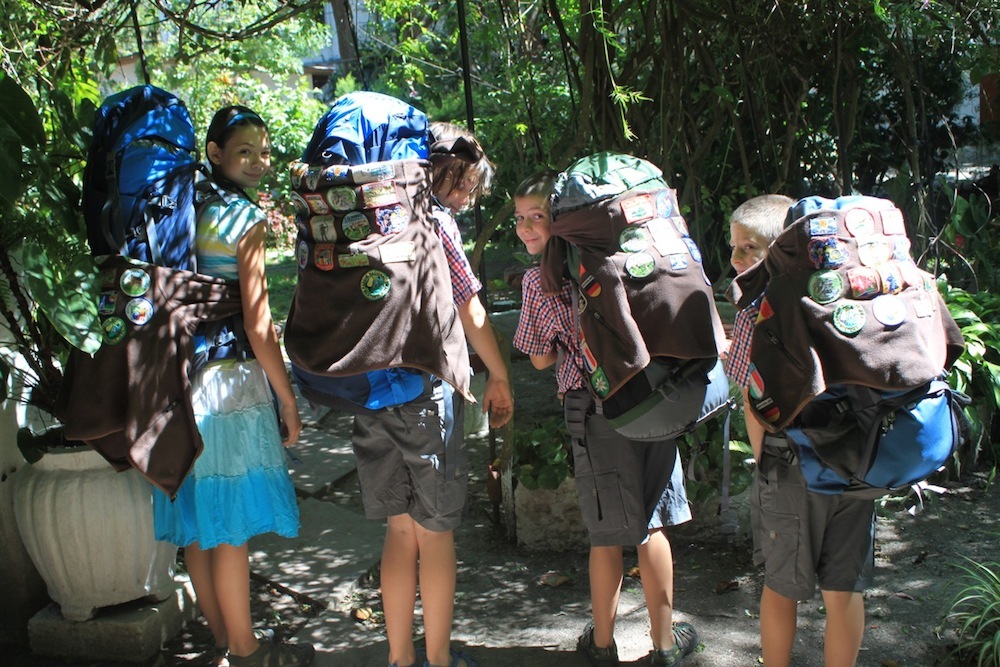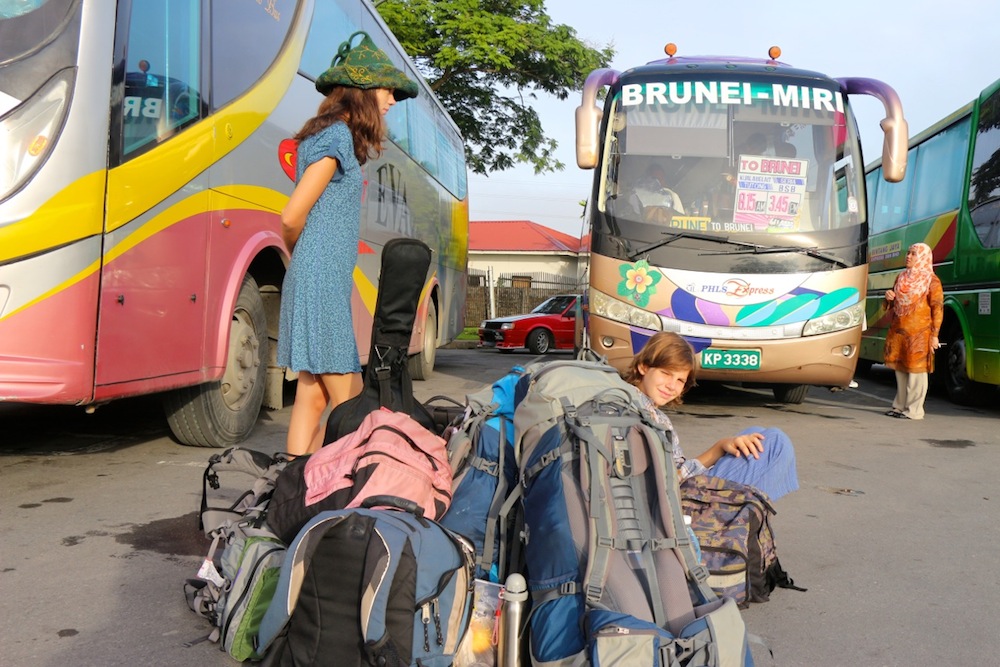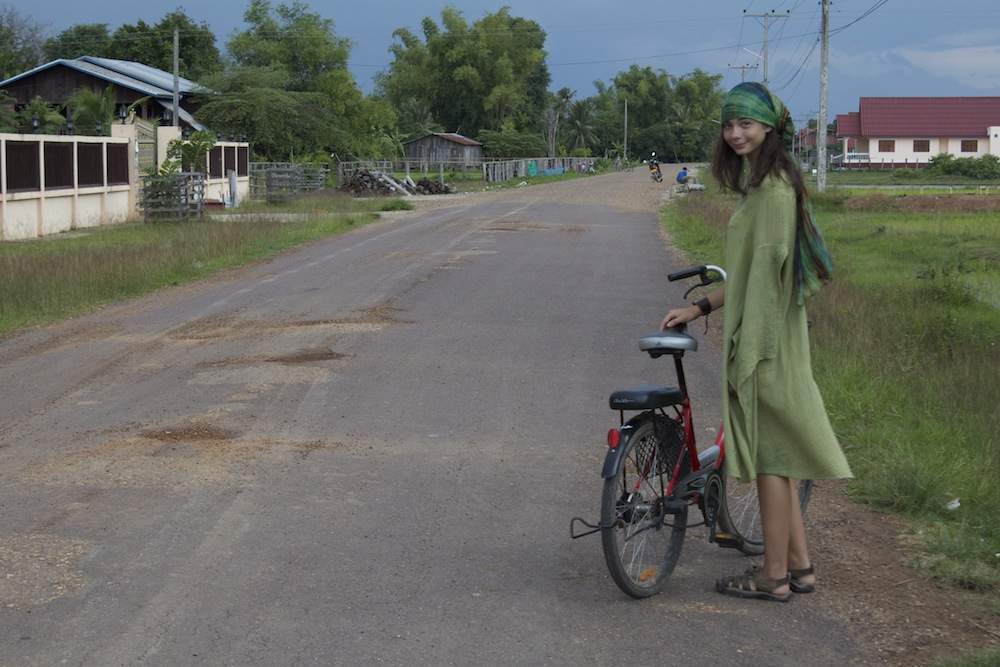I’d say I have a good deal of experience in family travel. It’s affected me, and my education, more than I can say. When I was eleven, my parents sold our house, quit their jobs, and began a life of full-time travel with me and my three younger brothers. First we took a year to cycle Europe and Northern Africa, living in tents and carrying our gear with us. After that, we decided we weren’t ready to stop traveling. My parents transitioned to distance careers (Mom is a freelance writer, editor, and more; Dad is a programmer and developer) we took our schoolbooks on the road, and together chose a new adventure to begin. I’m eighteen now, and have visited over 26 countries on five continents by bike, train, plane, bus, and of course, my own two feet. I’ve chronicled the adventure and beyond on Edventuregirl.
Traveling the world as a teen completely changed my outlook on life on more than one occasion, and provided me with many incredible out of the ordinary experiences and opportunities.
What has travel meant to my education? It has meant the world.

Suddenly, I was surrounded by other teens who were living a very different lifestyle from my own. I’d just spent the past year cycling Europe and Northern Africa, sharing a tent with my three younger brothers, and experiencing life completely unplugged. I’d never owned my own private computer, let alone my own phone. The girls around me were only a year or two older, but had bought into the stereotypical Western teen culture in a way I had never experienced elsewhere. Their clothes made them look a solid 6 years older, many had boobs where I did not, and most conversations led to their sexual encounters and jokes about how they hid it from their parents. I was the odd one. The girls would tease me about my virginity (at thirteen!) and try to hook me up with guys. Every time I refused, I became more and more of an outcast. Coming “home” was the first time I’d experienced pressure to fit in.
What about friends and being normal?

Travel opened my eyes to this issue, and showed me that there’s far more out there for teens than they’re told. There’s more to being a successful young adult than wearing trendy clothes, going to all the best parties with your girlfriends, flirting the summer away, and having the best furtive sex. Spending my teen years traveling internationally has given me the freedom to break free of peer pressure and modern expectations, and move on to start college at sixteen, work as a freelance writer and teacher, and speak out about teen travel and education.
Continuing education

Now, when I say that I’m majoring in Geography, people tend to look at me funny. It isn’t exactly the most common thing to major in; in fact, one guy I was talking to recently compared it to a degree in origami. A bit of a stretch? Yeah, probably. But when most people think of geography, they think of maps, tributaries, and reciting the state capitols. That’s all well and good, but I’m far more interested in the social side of geography. World politics, poverty, and how cultures of the world interact.
The technical definition of what I’ve chosen to study is:
The study of human societies and the relations between people and planet.
If I hadn’t traveled extensively as a young person, I probably wouldn’t have chosen to spend four years or more on this somewhat obscure academic field. World issues wouldn’t have hit as close to home as they do now. For example, a massive tsunami takes out a huge section of coastline in Southeast Asia? That’s the beach I lived on for six months. My neighbors were the ones out on the streets, missing family members. There’s earthshaking political upheaval in Guatemala? I’ve spent months living and working alongside indigenous Mayans in Guatemala. As we speak, they are fighting for change in a government that saw to the genocide of an estimated 200,000 indigenous between 1966 and 1990 and only now is justice beginning to be served.
- My eyes have been opened to the flaws in societies worldwide.
- I’ve played soccer with malnourished Cambodian children who can’t afford to go to school or wear clean clothes.
- I’ve shared my mandolin with tiny Guatemalan girls who at fourteen come to my waist because they live on a diet that consists almost entirely of maize.
- I’ve talked with immigrant American mothers who are struggling to raise a family on food stamps and subsidized living in a country where they’re bullied for not speaking perfect English.
It’s now impossible for me to continue to live as a bystander, and I’m not alone. Whether you’re a young backpacker on your first adventure, or fulfilling your dreams of travel as a retiree, I don’t believe it’s possible to witness starvation and abject poverty without being moved to do what you can to help.
It’s also impossible to continue taking the gifts I have as privileged Westerner for granted, especially where education is concerned. Watching others starve for lack of it, hike miles each day just to attend school, and sacrifice their quality of life to ensure that their children will be able to get an education has deeply affected how I think of my own schoolwork. It’s no longer a chore; something to dread as summer ends; the bane of childhood. It’s an incredible privilege to be able to attend school and enjoy three meals a day simultaneously. I feel almost as if it’s my responsibility to humanity to take the gift of education and run with it in the hopes that I can one day give back threefold. If all goes well, a degree in Geography will help me to get out there and start making a difference in a few lives at a time.
Take a semester in a different country. Learn to make friends in spite of language barriers and age gaps. Take a summer to wander Europe with a buddy. Commit to it, and go. Don’t be afraid to question things you may have always taken for granted; allow yourself to step outside of your comfort zone and experience something new and challenging; believe in your ability to exceed expectations and do incredible things. Who says you have to wait until you retire to travel? Get out there and make it happen! I guarantee it’ll change your life.